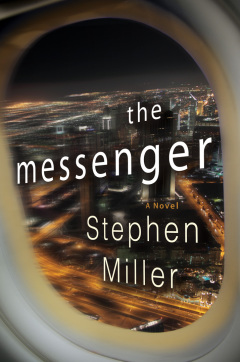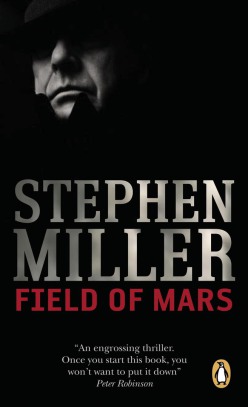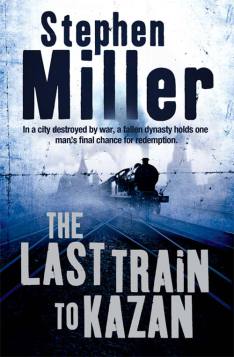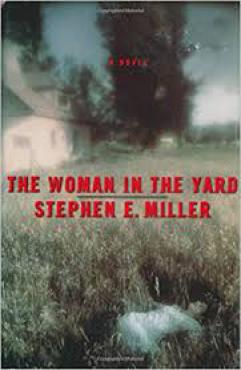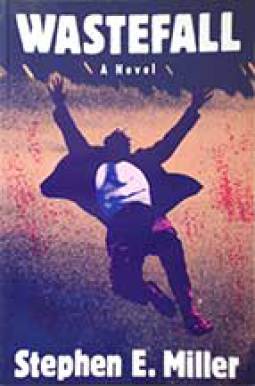Books
The Messenger
Delacorte Press in the US and Canada
Hardcover ISBN 978-0-345-52847-6 eBook ISBN 978-0-345-52848-3
Stephen Miller’s potent immediate novel of a young terrorist loose on the streets of the United States is perfect for the readers of intelligent character-driven novels such as John Updike’s Terrorist and Joseph O’Neill’s Netherland. In this harrowing exploration of a young woman’s mission, Daria has been sent to America and she holds the power of life and death in her hands. This is the story of two outsiders existing in the margins of their respective worlds. They are two enemies of the state: Daria–born in a refugee camp, raised in poverty, and Sam Watterman–a scientist who told his government the things they didn’t want to hear and was discredited, an ex-pat in his own country. Daria’s odyssey will bring her to the United States, on a journey of vengeance. Watterman’s path will take him from enforced obscurity into the war rooms of American intelligence. In the next 16 days, Daria will learn to question everything she has been taught. Watterman will learn that even evil has a human face. This is the story of two people from opposite sides of the globe, who did not know the other existed but who will affect each other in profound–even devastating–ways. Their next sixteen days will be the most extraordinary journey in a reader’s life.
For orders from Amazon: http://www.amazon.com/s/ref=nb_sb_noss/184-2531883-7564002?url=search-alias%3Dstripbooks&field-keywords=The+Messenger+by+Stephen+Miller&x=0&y=0
Praise for
“Stephen Miller’s novel The Messenger is both a high-stakes thriller and the story of a lost girl seeking answers to life’s most complicated questions. Warm, empathetic, fascinating, terrifying: The Messenger has it all!” —Amanda Eyre Ward, author of Close Your Eyes
“A real snake-charmer of a tale, The Messenger doesn’t unfold, it uncoils. You can only stare, appalled and fascinated, unable to avert your eyes. A riveting read, from beginning to end. This is Cormack McCarthy territory. It goes way beyond its genre.” – John MacLachlan Gray, creator of Billy Bishop Goes to War, author of The Fiend In Human, and more.
“A chilling, heart-thumping, masterfully-written thriller. Stephen Miller has created a complex anti-heroine in the character of Daria Vermiglio, a portrait of a bio-terrorist so well rendered that we can relate to her, understand her, and identify with her journey from complete conviction to regret for her actions once she meets some of her victims: the American poor. Miller pulls no punches in his richly detailed depiction of present-day, under-class United States, his portrayal as compassionate to his subjects as it is a denunciation of a system that has disenfranchised the majority of its citizens.” —Carmen Aguirre – author of Something Fierce: Memories of a Revolutionary Daughter, winner of the 2012 Canada Reads competition.
“Miller writes beautifully, is hugely well-informed on the subject of biological weaponry, and, more impressively still, manages to say something strikingly original about contemporary terrorism. His American society – awash in meaningless commercialism, appalling inequalities, endemic racism and sexism – is the perfect target for his Middle Eastern anti-heroine’s dreadful mission. Miller gets it that, in the widest context, the war on terrorism, like the war on drugs, is as much about us as it is about them. A chillingly intelligent read.” —David Downing
Field of Mars
Penguin Canada and HarperCollins UK ('A Game of Soldiers')
Penguin paperback: ISBN 978 0 14 301772 1
It is 1913 and the world is a dangerous place. The Great Powers are locked into a frenzied arms race, the decadent Ottoman empire is in retreat, and the Austrian and Russian Empires intrigue ceaselessly to further their own ambitions. In St. Petersburg, the weak Tsar is preoccupied with his afflicted son and has isolated himself from his starving subjects.
Pyotr Ryzhkov, a government agent, is used to keeping his head down and minding his own business. But the immediate cover-up of the death of a child prostitute, which he happens to witness, drives him to probe into what he is sure is murder.
As he investigates the cover-up of the murder, Ryzhkov probes the inner sanctum of power from his own superiors in the secret police to the interlocking interests of St. Petersburg’s military and business families. His dogged pursuit eventually leads him to uncover an international conspiracy to overthrow the Tsar and destabilize Russia – a high-stakes plan that threatens his country and his life.
Urgently paced, intensely felt, and wonderfully atmospheric, Field of Mars is a remarkable thriller about a society on the cusp of cataclysmic change.
Praise for
“Lets get one thing said first: This is one hell of a historical thriller. ” – Margaret Cannon , The Globe and Mail
“A vivid reconstruction of the complex politics of the period which still resonate today” – Sunday Telegraph
“An alternative history to get your conspiracy theory brain cells working” – Ladsmag
“Field of Mars (A Game of Soldiers) is an engrossing thriller in which an apparently unremarkable crime leads to the highest echelons of Russian society in 1913. With every twist and revelation, the suspense grows, and the reader is carried along by a narrative full of incident, character, and period detail. Stephen Miller paints in bold strokes on a large canvas. Once you start this book, you won’t want to put it down.” – Peter Robinson
Reviews
Margaret Cannon – The Globe and Mail
Lets get one thing said first: This is one hell of a historical thriller. Actor Stephen Miller (Lt. Zack McNab on DaVinci’s Inquest) knows how to construct characters and build suspense. He’s also done a yeoman’s job researching the Russian empire in 1913: everything from Dada cabaret to haute-monde couture. He also has an actor’s sense of place. We are there, in the midst of Petersburg, 1913, and as we know, but the characters do not, the modern world is about to be born in the blood and iron of the First World War. Miller’s plot is simple. A child prostitute is murdered. The case is covered up because high officials are involved. A policeman refuses to forget the murder, follows the clues, falls into a web of conspiracy and treason. Will he survive? That said, there are lots of tricks in this book. Pyotr Ryzhkov is no ordinary copper. He’s an investigator with the Okhrana, the feared Tsarist secret police. The plotters are not revolutionaries, but ultra-conservatives, greedy for power. The chase that takes Ryzhkov to the powder-keg of the Balkans has eerie overtones of today. In fact, the whole setup seems vaguely familiar: a huge empire with Middle Eastern aspirations and a seemingly unconquerable army blunders into a local war between two smaller countries and is forced into a major conflagration leading to a world war. Tsar Nicholas, invincible in his divinity and stupidity, seems remarkably modern, as do the courtiers and apparatchiks surrounding him. Miller is bound to be compared to two other mainstream crime authors: Boris Akunin and Martin Cruz Smith. Despite the date and the secret-police plot, Miller is not attempting the charm and dash of Akunin. He’s far closer to the darkness and desperation of Cruz smith, but he’s not there yet. My only complaint, and it is minor, is that Miller has a tendency to overwrite, repeat and list. These are all problems that can be and should have been rectified with judicious editing. A good pruning would make this book tighter and leaner. But Miller is an author to watch. We have a lot of characters surviving in this book, all of whom still have a war and a revolution to come.
Joe Wiebe – Vancouver Sun
Stephen Miller’s novel is more than a thriller, it’s a masterpiece of historical fiction. Examining the author photo on the new novel Field of Mars, fans of the excellent TV series DaVinci’s Inquest will recognize it as Vancouver’s own Stephen Miller. But they may find it hard to imagine the quirky character he plays – that of bumbling traffic inspector Zack McNab – as the author of any book, let alone such an accomplished, complex, finely wrought and literate work. Field of Mars is a masterpiece of historical fiction. The world Miller evokes – its Russia in 1913 – 14, the lead-up to the first World War – and the characters who reside there are vibrant and alive. Although the story is saturated with historical detail, it flows forward effortlessly. Strong, complex characters are anchored by a thriller plot that rises above the genre’s conventions to probe the psychological and sociological implications of one of the most important years in 20th century history. At the centre of the novel is Pyotr Ryzhkov, a St. Petersburg gorokhovnik – that is, a member of the Internal Agency of the Okhrana, Czarist Russia’s secret police. He’s “the one who cleaned up the trash, swept the mess of the empire into the corner, and then saluted his betters as if nothing had ever been there.” For Pyotr as for most of his colleagues, family life is futile. Internal Agents are on call 24 hours a day. All he has to look forward to is a life spend in anonymous service to the Czar; he’s “a kind of necessary rat, a creature devoid of status, respect, or glamour. Something vile, ruthless, and efficient.” As the novel opens, Ryzhkov leads a troika of agents assigned to follow Blue shirt (better known as Rasputin, the Mad Monk) who has the ear of the Imperial Family – and probably the bed of the Czarina, too. Their job is to guard him from foreign agents or revolutionary elements. This boils down to keeping him out of the newspapers – a difficult task, considering his popularity and notoriety as a philanderer. They’re watching Rasputin at a high-society brothel when a child prostitute falls from an upper window to her death. While his partners hustle Blue Shirt out of the building, Pyotr manages to get a look at the girl and notices marks around her neck. Pyotr Ryzhkov is a truly classic character, a morally driven hero whose efforts are thwarted at all turns by the rigid classism and autocracy of the society in which he lives. When the girl’s death is called a suicide, in spite of clear evidence of homicide, he sets out to uncover the truth, putting his own life at risk. As he investigates, he inadvertently becomes ensnared in a web of conspiracy that rises to the pinnacles of Russian society and eventually leads to the assassination of the Archduke Franz Ferdinand in Sarajevo and the advent of the Great War. Along the way, Ryzhkov falls in love with Vera Aliyeva, a prostitute who witnessed the girl’s murder. When he tracks her down, Vera has quit her old life and become a dancer at the Komet, a nightclub that draws the literati and the artistic set because of its politically charged dance shows. Although she has all the earmarks of the clichéd hooker with a heart of gold, in Millers hands Vera is a complex pre-Revolutionary woman caught between the ancient Russia and the modern one. There are other great characters here too. They include Ryzhkov’s two partners – big loyal Kostya Hokhodiev and young ruthless Dima Dudenko – and the high-society conspirators strategizing to topple the Czar and profit from the ensuing chaos. The other great character is the city of St. Petersburg. Miller describes it so vividly, you’d think him a lifelong resident. He gives us everything from the feel of the cobblestones underfoot to the sounds and smells of the factories and canals and the always-encroaching swampland on which the city was built. Judging by the depth of research he describe in his acknowledgements Field of Mars was a labour of love for Stephen Miller. It has paid off: His book is an engrossing, insightful, entertaining and though-provoking novel – easily one of the best Canadian books of the fall, if not in all of 2005.
The Last Train to Kazan
HarperCollins UK, London, 2007, Penguin Canada (2007)
Paperback ISBN 978-0-00-719123-9
Moscow in the summer of 1918. After a series of harrowing experiences on the Western Front, Pyotr Ryzhkov is working for French intelligence in Moscow. Arrested by agents of the newly formed Cheka, the Bolshevik secret police, he is certain that he will be executed in a blood-splattered Lubyanka courtyard. Instead he finds himself being pressured into working with this old Okhrana boss, Velimir Antonovich Zezulin who has changed his identity and rehabilitated himself as a Cheka controller. What Zezulin wants to know is the exact whereabouts and condition of the Imperial family. The Romanovs, exiled to Tobolsk for the winter, have suddenly been moved to a far more militant region – Yekaterinburg, home to the “ultra-loyal” Ural soviet. But Yekaterinburg is a city under attack. All along the Trans-Siberian railroad former Czechoslovak prisoners of war have joined with White forces and now they approach the outskirts. Ryzhkov’s mission: travel to Yekaterinburg, penetrate Czech lines if they have already taken the city, find out and report back on the situation of the Romanovs. The events in July of 1918 in the Ipatiev house will be mired in confusion for nearly a century. Rumours will be repeated as history. But the true fate of the Romanovs will be the most closely held secret in the Kremlin.
THE WOMAN IN THE YARD
Picador USA, an imprint of St. Martin’s Press, 1999.
Hardback: ISBN 0-312-19962-7 Paperback: ISBN 0-312-26414-3
Eager to build a career in law enforcement, Korean War veteran Q.P. Waldeau becomes acting sheriff in the small costal community of Wilmington, North Carolina. But when the brutalized body of a black prostitute washes up on the bank of the Cape Fear – in the hung-over early hours of New Year’s Day 1954 – he confronts a professional and political dilemma with the potential to derail his ambitions. As the simmering prejudices aroused by subsequent killings threaten to demolish the community’s fragile racial hierarchy, Waldeau must negotiate a dangerous course between his political instincts, his professional discipline, and his moral duty. When those same tensions explode in outright violence, he finds his career, and his life – and then the life of the woman he loves – in peril. Set amid the darkness that heralded the dawn of the New South, The Woman in the Yard captures the atmosphere, the passion, and the paranoia that charged an era and changed a generation.
Praise For
“The Woman in the Yard is a stunning first novel – richly textured, historically
valid, accented by eye-popping explosive scenes and brilliant insights. Stephen Miller has raised the southern cop genre to a new level.”
– Jack Olsen, bestselling author of Salt of the Earth and Hastened to the
Grave
“The Woman in the Yard is an intriguing period piece police procedural that will
gain much reader attention for author Stephen Miller…Mr. Miller has raised the quality level of the historical rural southern police procedural with this entertaining novel.”
– Midwest Book Review
“Miller moves his cast skilfully around a carefully nuanced stage…Things do not come
out heroically, but believably…Miller hits all the marks just right ”
Tulsa World
“Miller ably portrays a South commencing the wrenching change from Jim Crow to Dr.
King…A great yarn.”
– Ft. Pierce Tribune
“The Woman in the Yard is crammed full of atmosphere, well-chosen events and
distinct and richly evoked characters…”
– The Globe and Mail
“Miller traverses familiar territory but he keeps the topic fresh with a
smoothly-constructed narrative that is deceptively light, well-paced and thoroughly entertaining…”
– Donna Bailey Nurse, National Post
“Miller makes a welcome entrance to the field.”
– Publishers Weekly
“Mr. Miller has raised the quality level of the historical rural southern police
procedural with this entertaining novel”
– The Midwest Book Review
“This first novel reflects the violent passions of its age….Powerfully told in vivid
detail…compelling”
– The Dallas Morning News
Wastefall
Arsenal Pulp Press, 1990
Paperback: ISBN 0 88978 220 2
Winner of the 12th International Three-Day Novel contest. Published by Arsenal Pulp Press. The story of a man who lives his life in a garbage dump, and the child he raises in his own image.
